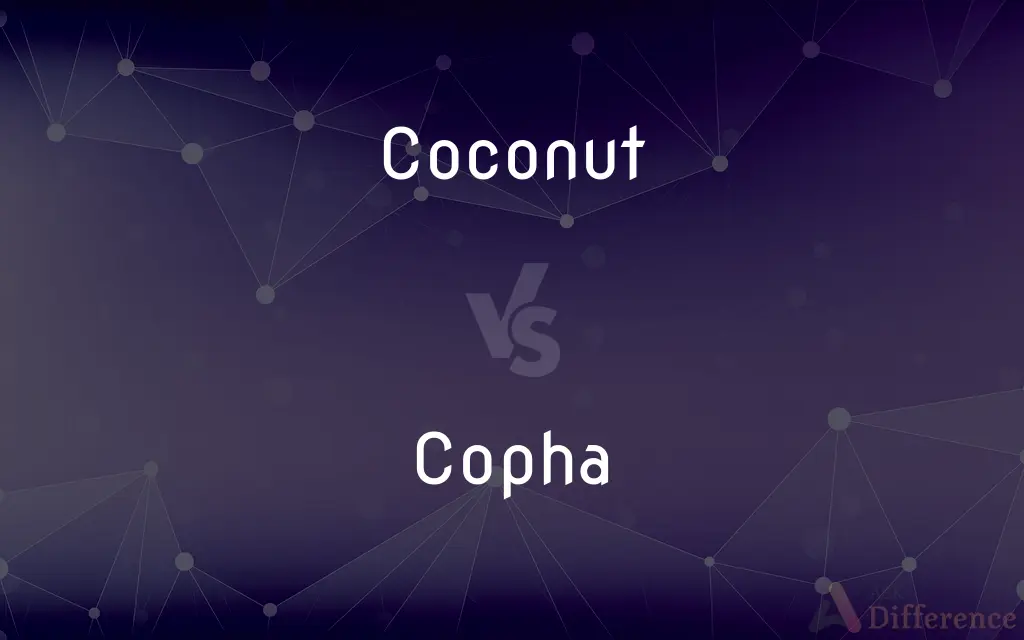Coconut vs. Copha — What's the Difference?
By Tayyaba Rehman & Maham Liaqat — Updated on April 4, 2024
Coconut refers to the fruit of the coconut palm, known for its edible flesh and water, while copha is a form of solidified coconut oil used primarily in baking and confectionery.

Difference Between Coconut and Copha
Table of Contents
ADVERTISEMENT
Key Differences
Coconut is a versatile fruit harvested from the coconut palm. It is celebrated for its wide range of uses, from its refreshing water and nutritious flesh to the oil extracted from its meat. Copha, on the other hand, is a specific product derived from coconut oil.
While coconut in its various forms is consumed and used worldwide in a myriad of culinary, cosmetic, and health-related applications, copha's use is more niche, focusing mainly on its role as a solid fat in baking and candy making. The process of hydrogenation that copha undergoes distinguishes it from regular coconut oil, altering its chemical structure and physical properties to suit specific culinary needs.
The primary connection between coconut and copha is that copha is derived from coconut oil, linking them in the chain of production from the coconut fruit. However, the uses and applications of copha are distinct from those of other coconut-derived products due to its solid state at room temperature, which is achieved through hydrogenation.
Both coconut and copha highlight the versatility and value of the coconut palm, each serving different needs and preferences. While coconut provides a broad spectrum of nutritional and practical uses, copha offers a specialized function in cooking and baking that exploits the unique properties of hydrogenated coconut oil.
Comparison Chart
Source
Fruit of the coconut palm
Hydrogenated coconut oil
ADVERTISEMENT
State
Raw, varied forms (water, oil, flesh, etc.)
Solidified oil, remains solid at room temperature
Main Uses
Culinary, hydration, skincare, haircare
Baking, confectionery
Nutritional Value
High in fiber, vitamins, minerals
High in saturated fat, used sparingly in diet
Physical Properties
Liquid (water), semi-solid (flesh), oil
Solid
Popularity
Worldwide
Mainly in Australia, for specific recipes
Compare with Definitions
Coconut
A versatile fruit with a hard shell, edible flesh, and water inside.
Coconut water is a popular drink for hydration.
Copha
Remains solid at room temperature, unlike regular coconut oil.
Copha is used in recipes that require a firm texture.
Coconut
Coconut shells are utilized in crafting and as charcoal.
Coconut shell charcoal purifies water and air.
Copha
A solid form of coconut oil, used in baking and confectionery.
Copha is essential for making chocolate crackles.
Coconut
Used in various forms in cooking, cosmetics, and health products.
Coconut oil is a key ingredient in vegan baking.
Copha
Hydrogenated to alter its physical properties for specific uses.
The hydrogenation process makes copha a solid fat.
Coconut
Provides essential nutrients and benefits in skincare.
Coconut milk is used in shampoos for its nourishing properties.
Copha
Used sparingly due to its high saturated fat content.
Although high in fat, copha is key for certain confections.
Coconut
The flesh can be eaten fresh or dried, known as desiccated coconut.
Desiccated coconut is used in cakes and cookies.
Copha
Popular in Australian cuisine for desserts and sweets.
Copha is a staple in many Australian holiday recipes.
Coconut
The coconut tree (Cocos nucifera) is a member of the palm tree family (Arecaceae) and the only living species of the genus Cocos. The term "coconut" (or the archaic "cocoanut") can refer to the whole coconut palm, the seed, or the fruit, which botanically is a drupe, not a nut.
Copha
Copha, a registered trademark of Peerless Foods, is a form of vegetable fat shortening made from hydrogenated coconut oil. Copha is produced only in Australia, but there are many suppliers of hydrogenated coconut fat in various forms worldwide.
Coconut
The fruit of the coconut palm, consisting of a fibrous husk surrounding a large seed.
Copha
A vegetable shortening made of coconut oil, used in cooking.
Coconut
The large, brown, hard-shelled seed of the coconut, containing white flesh surrounding a partially fluid-filled central cavity.
Coconut
The edible white flesh of the coconut, often shredded and used in food and confections or for the extraction of coconut oil.
Coconut
A coconut palm.
Coconut
A fruit of the coconut palm (not a true nut), Cocos nucifera, having a fibrous husk surrounding a large seed.
Coconut
A hard-shelled seed of this fruit, having white flesh and a fluid-filled central cavity.
Coconut
(uncountable) The edible white flesh of this fruit.
Coconut
The coconut palm.
Coconut
A Hispanic or other dark-skinned person considered to have overly assimilated to white culture, a race traitor.
Coconut
A black person considered to have overly assimilated to white culture, a black race traitor.
Coconut
A Pacific islander.
Coconut
(slang) The human head.
Coconut
The edible white meat of a coconut{3}; often shredded for use in e.g. cakes and curries.
Coconut
The cocoa palm.
Coconut
The large, hard-shelled oval nut of the cocoa palm. It has a fibrous husk containing a thick white fibrous meat much used as food, in confections, and in making oil. It has a central cavity filled (when fresh) with an agreeable milky liquid.
Coconut
The edible white meat a coconut; often shredded for use in e.g. cakes and curries
Coconut
Large hard-shelled oval nut with a fibrous husk containing thick white meat surrounding a central cavity filled (when fresh) with fluid or milk
Coconut
Tall palm tree bearing coconuts as fruits; widely planted throughout the tropics
Common Curiosities
Is copha healthier than other forms of fat?
Copha is high in saturated fat, making it less healthy than unsaturated fats; it should be used sparingly in diets.
What are some common recipes using copha?
Copha is used in chocolate crackles, copha cake frosting, and various other desserts requiring a solid fat.
Can you eat coconut raw?
Yes, the flesh of the coconut can be eaten raw and is often enjoyed for its nutritional benefits and taste.
What is coconut used for?
Coconut is used for hydration (coconut water), in cooking (coconut oil, milk, and flesh), in cosmetics (coconut oil and milk), and in health products.
What makes copha different from coconut oil?
Copha is hydrogenated coconut oil, solid at room temperature, making it suitable for recipes requiring solid fat.
Can I substitute coconut oil for copha in a recipe?
Substituting coconut oil for copha may not always work due to differences in melting points; copha is used when a solid fat is required.
Why is copha popular in Australian cooking?
Copha is popular in Australia for its unique property of remaining solid at room temperature, ideal for baking and making confectioneries like chocolate crackles.
Is there an environmental concern associated with coconut production?
Like all agriculture, coconut production can have environmental impacts, including deforestation and habitat loss; sustainable practices are important to minimize these effects.
What are the health benefits of coconut?
Coconut is high in fiber, vitamins C, E, B1, B3, B5, and B6, and minerals including iron, selenium, sodium, calcium, magnesium, and phosphorous.
How is copha made?
Copha is made by hydrogenating coconut oil, which changes its chemical structure to remain solid at room temperature.
Share Your Discovery

Previous Comparison
Pizza vs. Pizzetta
Next Comparison
Underground vs. BasementAuthor Spotlight
Written by
Tayyaba RehmanTayyaba Rehman is a distinguished writer, currently serving as a primary contributor to askdifference.com. As a researcher in semantics and etymology, Tayyaba's passion for the complexity of languages and their distinctions has found a perfect home on the platform. Tayyaba delves into the intricacies of language, distinguishing between commonly confused words and phrases, thereby providing clarity for readers worldwide.
Co-written by
Maham Liaqat













































